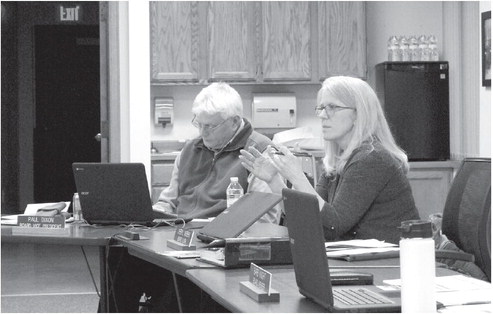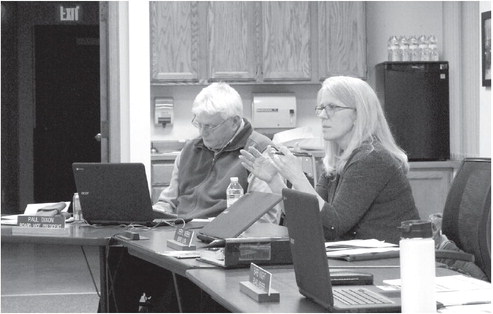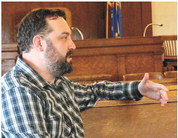Sullivan noted that the secretaries ….


Sullivan noted that the secretaries in the buildings are all still working and being paid, as well as the administrators and janitors. Teachers are also continuing to get paid under the terms of their contract as they deliver educational materials for home-based learning under the shutdown.
Sullivan said the hope is to have these staff members work in assisting other areas, such as with the delivery of meals to students or with custodial tasks or assisting with maintaining contact with students. He noted though that there may not be enough work for the aides to do.
The nine-month support staff positions work hourly and pay 20% of their insurance premiums. According to finance director Audra Brooks, the school’s options were wide open as far as how they wanted to proceed.
“You can be as creative as you want,” she said, noting the most extreme case would be to direct the employees to file for unemployment and then charge them for the 20% of the insurance premiums.
While this would have resulted in the district saving money on payroll, because of how unemployment compensation is handled with schools it would not be a signifi cant savings. Unlike private employers who pay into state and federal unemployment trust funds, schools and other governments are billed directly for 100% of the unemployment claims when they are filed. “It is dollar for dollar,” Brooks said, noting that while there would be some savings since the employees would not be getting their complete wage and the district would not be paying into Social Security or the state retirement fund, she did not advise that as being a good option to use.
Sullivan said other districts he has contacted have ranged from putting these employees on unemployment to paying them at the base rate at which they were hired, in some cases going back 20 years. Sullivan noted the district had budgeted to pay these positions through the end of the school year, so this would not have additional cost for the district. He said his goal was to put as many of them to work as possible, but said there may be people who are being paid and who are not working.
“I am not opposed, but I think we will get a lot of backlash in the community,” said board member Cheryl Wibben. She noted that many small business are being shut down because of the COVID-19 crisis and that there is no relief in sight for those businesses. She said it would be a hard pill for some of them to swallow.
Board chairman Dave Fleegel questioned why the board would want to create a savings now when they don’t know what the ripple effects of the COVID-19 will be. He suggested as a compromise that the board approve it for a month, holding out hope that school could reopen this year.
Hallgren was less optimistic about school resuming this year, but agreed to clarify his motion that if school came back into session the staff would be required to be at work. One of the things that made the district’s decision easier to make was that the state had already announced that none of the days missed due to the pandemic would have to be made up.
Sullivan said that in order for the support staff to be eligible for pay, they would have to be ready to work on any regular workday. He said if he called an employee to come in and they refused without a valid reason, they would not be paid for that day.
Brooks also noted that there were opportunities for professional development through webinars and other activities which would end up being beneficial for the district as a whole and the employees.
Hallgren said he was sympathetic to small businesses being impacted by the shutdown. “I don’t think there are words to describe what small business is going through right now,” he said.
Board member Mark Temme noted that there are eight weeks remaining in the regular school year and that it is a different thing than if there were six months.
Brooks raised one of the more pressing points noting that teacher’s aides and other support staff positions have been very hard for the district to fill. “We don’t want to lose them,” she said.
Board members voted unanimously to approve continuing to pay support staff employees through the end of the school year.
Education changes
Education in the Medford school district during the COVID-19 shutdown will focus on the “Three Es” of being engaging, enriching and exciting.
Administrators at each of the elementary, middle school and high school level reported on meetings held with staff and plans that ranged from distributing packets to students at the elementary level, to holding a set scheduled of 30-minute online classes at middle school to putting the emphasis on ensuring students have the ability to graduate and have the coursework they need.
One of the challenges shared by all the administrators was that significant percentages of students in each of the schools had no access to internet at home, which limits what types of delivery methods can be used.
Sullivan praised the staff for stepping up to the challenge of dealing with the ever-changing situation.
Wibben raised the concern about if there had been any talks about how the district would need to play catch up for students next year. Sullivan responded that they were dealing with this year and had not looked that far ahead.
As of right now, no decisions have been made regarding changing graduation or the end of the year activities other than to have all scheduled trips canceled. The district is waiting to see what will happen with the shutdown.
Storage building
With a combination of funding from savings in this year’s budget and a $100,000 contribution from the Rural Virtual Academy (RVA), board members approved building a new storage building to the east of the tennis courts at the high school campus.
The building will include an office for buildings and grounds supervisor Dave Makovsky as well as work space for his staff. In addition, it will serve to house the district’s 10 vans and trucks as well as the vehicles, equipment and records storage of the RVA.
Sullivan estimated that based on the square footage of the proposed building it would cost about $200,000. RVA administrator Charlie Heckel said his board would be willing to support half of that cost. While chartered under the Medford School District the RVA is a consortium of districts and has an independent board that governs its activities and how money is spent.
Hallgren supported building the building noting that anytime you can double your money, it would be worthwhile to do it.
Brooks noted that with the money needing to be committed by the end of the fiscal year, the timing is good to move on it now rather than delaying the project. The hope is to have construction take place this spring or early summer.
In other business, board members:
_ Approved a motion to include $15,000 in next year’s budget and place it in the Fund 46 account for the eventual replacement of the artificial turf at the high school. The turf is expected to have a useable lifespan of 12 to 15 years. Sullivan has suggested the district follow the model of fundraising when it needed to be redone. However, board member Barb Knight disagreed and said she felt the district should be putting money away for it. “I would like us not to rely on donation,” Knight said, noting that while the district would welcome contributions, they would want to be setting funds aside also.
Knight initially suggested a $20,000 a year contribution, while Temme countered suggesting a contribution of what was actually spent on mowing and maintenance which was closer to $7,000 a year. The $15,000 a year was a compromise amount, which Temme noted is not a significant increase over what the district had budgeted for upkeep in the past.
_ Discussed the need for devices to make conference calls easier. Knight asked for the board to consider looking into purchasing the equipment. She cited the problem of holding a conference call and people having to use a standard desk phone and try to yell into it from around a room. Fleegel suggested they may want to hold off and look at alternatives such as web-based meeting applications which allow for video conferencing. Fleegel appeared by video conferencing and ran the meeting from his self-quarantine location with Mark Reuter also appearing remotely via video conference. There were also remote sites set up at Medford Area Elementary School, Medford Area Middle School, Medford Area Senior High School and at the Taylor County Education Center to allow people to attend and participate in the meeting while still keeping the gathering to under 10 people in one place and following the social distancing guidelines. Sullivan noted there were speaker phones already on order, but, like with many technology items, have been delayed due to the shutdown. Sullivan said staff members will continue to look into other options.





